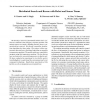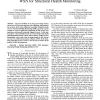697 search results - page 103 / 140 » Adaptive Scheduling in Wireless Sensor Networks |
134
click to vote
MASS
2010
14 years 11 months ago
2010
Wireless sensor networks typically conserve energy by following a periodic wakeup-sleep schedule: nodes minimize idle time and spend most of their time in a low power sleep state. ...
176
click to vote
CONEXT
2008
ACM
15 years 3 months ago
2008
ACM
Wireless multi-hop networks are particularly susceptible to attacks based on flooding and the interception, tampering with, and forging of packets. Thus, reliable communication in...
135
click to vote
FSR
2003
Springer
15 years 6 months ago
2003
Springer
We develop a network of distributed mobile sensor systems as a solution to the emergency response problem. The mobile sensors are inside a building and they form a connected ad-ho...
125
click to vote
ADHOCNETS
2009
Springer
15 years 3 months ago
2009
Springer
Abstract. As wireless sensor networks gain in popularity, many deployments are posing new challenges due to their diverse topologies and resource constraints. Previous work has sho...
104
click to vote
DATE
2010
IEEE
15 years 6 months ago
2010
IEEE
— The task scheduler of an energy harvesting wireless sensor node (WSN) must adapt the task complexity and maximize the accuracy of the tasks within the constraint of limited ene...


